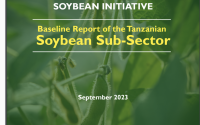Minister Bashe Advocates for Private Sector Engagement in Agriculture at Oslo Climate and Food Security Forum
On February 14, 2024, a pivotal debate unfolded at the Climate House in Oslo, Norway, centered on the intertwined issues of food security and climate change. The forum was part of a broader engagement between Tanzanian and Norwegian officials, aiming to deepen cooperation on these critical global challenges. Among the distinguished participants was Tanzania’s Minister of Agriculture, Hon. Hussein Bashe, who shared the stage with key policymakers, including Hon. Dr. Selemani Jafo, Minister of State in the Vice President’s Office for Union Affairs and Environment.
Tanzanian Government’s Proactive Measures
During the dialogue, Minister Bashe articulated the Tanzanian government’s strategic efforts under the leadership of President Dr. Samia Suluhu Hassan to foster an enabling environment for private sector investment in agriculture. This initiative is aimed at boosting production and enhancing the export of agricultural commodities, reflecting the Sixth Phase Government’s commitment to agricultural and economic development.
The presence of prominent figures such as President Samia Suluhu Hassan, Hon. Anne Beathe Tvinnereim, Norway’s Minister of International Development, Hon. Tine Tonnes, the Norwegian Ambassador to Tanzania, and Hon. Grace Olitu, the Tanzanian Ambassador to Norway, underscored the event’s significance. The high-level participation highlighted the mutual interest in addressing food security and climate change, reaffirming the commitment of both nations to work together on these pressing issues.
Strengthening Private Sector Engagement
Minister Bashe’s remarks emphasized the critical role of the private sector in achieving sustainable agricultural growth and resilience against climate change. By creating a conducive investment climate, the Tanzanian government aims to attract both local and international investors to the agricultural sector. This strategy includes improving access to finance, enhancing agricultural research and development, and investing in infrastructure to reduce post-harvest losses and improve market access.
The dialogue also shed light on the importance of adopting climate-smart agricultural practices to ensure food security in the face of changing weather patterns. The integration of modern technology in farming, such as precision agriculture and the use of drought-resistant crops, was highlighted as key to increasing productivity and sustainability.
Bilateral Cooperation for Sustainable Development
The Oslo forum served as a platform for Tanzania and Norway to explore avenues for collaboration, particularly in the areas of technology transfer, capacity building, and investment in sustainable agriculture. The discussions are expected to lead to concrete partnerships and projects that will bolster Tanzania’s agricultural sector, contribute to global food security, and mitigate the impact of climate change.
The engagement between Tanzanian and Norwegian officials in Oslo reflects a shared understanding of the importance of agriculture in economic development and environmental sustainability. It underscores the need for international cooperation and public-private partnerships in tackling the dual challenges of food security and climate change.
The participation of Minister Hussein Bashe in the Oslo debate on food security and climate change is a testament to Tanzania’s proactive stance on these global challenges. By championing private sector engagement and international cooperation, Tanzania is paving the way for a more resilient and productive agricultural sector. This approach is not only crucial for Tanzania’s development but also contributes to the global efforts to ensure food security and combat climate change in an increasingly interconnected world.

